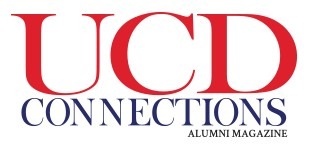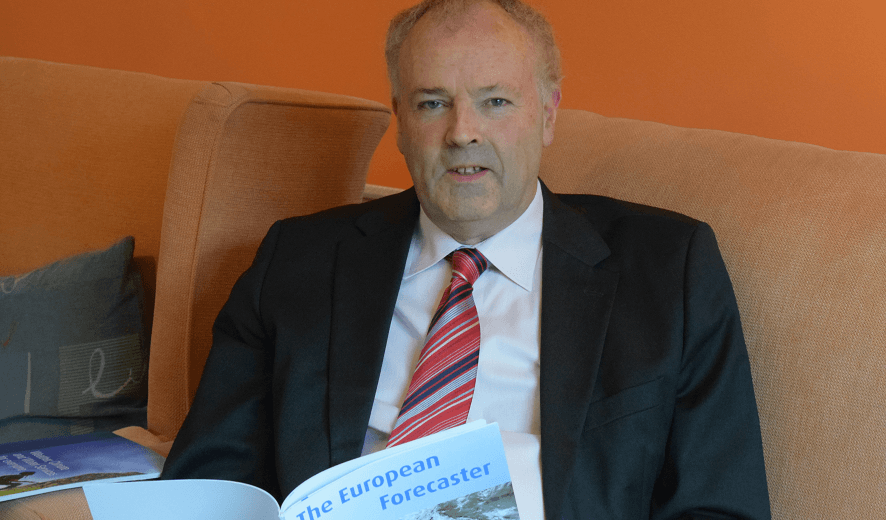Gerald Fleming is an experienced broadcaster and meteorologist.
Gerald was Head of Forecast with Met Eireann for almost ten years and is a familiar face as leader of the RTÉ Weather Team for many years before that. He has been Chair of the Public Weather Service Delivery Programme since 2005 and is currently enjoying retired life. Here he discusses his memories of UCD Belfield as a “new” campus and the social scene for a student in the mid-to- late 1970s.
1. What was your UCD experience like – the social scene, classes, lecturers?
I was in UCD between 1974 and 1980, emerging with a BSc and MSc in Experimental Physics. Belfield was very “new” then – the campus was only ten years old, although as we were in the oldest part, the Science Block, we felt it had been there forever. It was daunting to come in as a first year – class sizes were about 300 for subjects like Chemistry and Maths, which nearly everyone took. Lecturers were, as always, variable – some were inspirational and some were very boring. There was a very vigorous student society scene with evening lectures on all sorts of diverse topics available, together with the obligatory free beer/wine and sandwiches afterwards. Attending those lectures brought my first realisation that a skilled and talented presenter could bring any subject to life, even one that was not of any direct interest to me in terms of my preferred academic subjects. I had a good friend doing social science, so I used to attend a lot of society events in the Arts block as well (which was unusual for a science student back then). As I progressed, the class sizes quickly became smaller, of course – there were just 13 of us who took Honours Physics in 3rd and 4th year, and we socialised a lot together as a group. I got involved in the “Science Society” (which was really the Physics Society) and we ran the annual “Science Ball” at Christmas – at that time in the Great Hall in Earlsfort Terrace which is now the National Concert Hall.
2. What is your fondest memory from that time?
Bicycles were the preferred mode of transport around the city and those of us “up from the country” quickly got to know the streets and roads of south Dublin – at least from Rathmines and Harold’s Cross over to Dublin Bay, where most of us were billeted. We were all on tight budgets, and buses were reserved for trips into town for weekend visits to the cinema. One or two classmates had cars, or could use their parent’s car at weekends (if they were Dubliners) and they were, of course, in great demand for “lifts”. One of the highlights of my time in UCD was a visit to Germany part-funded by the “German Academic Exchange Service” (the Science Society ran weekly discos to raise the balance of the costs). With a very patient and understanding lecturer in tow, we visited a number of research sites and science-related businesses in Germany. A visit to the concentration camp in Dachau was very sobering, while some days spent in nearby Munich offered the opportunity (eagerly availed of) to sample the produce of the numerous Bavarian breweries. While in Munich, and with the connivance of a friendly coach-driver, we departed somewhat from the academic programme and took in a Bayern Munich game in the Olympic Stadium. So, I can say that I saw Franz Beckenbauer play in his prime, a treasured memory still!
3. How did you end up in your area of work?
Meteorology, or the science of weather, is something that seems to engender an obsessive interest in many, but I was not one of those people. A career in the Met Service was not something I had thought much about, but a colleague who shared my lab when we were doing MSc research was very keen on it. I went along to the interview, as much to keep him company as anything. On the other hand, science-based jobs were not very plentiful in Ireland in the late 1970’s. He was offered a job immediately and I was offered it a year or so later, and we both went on to have long careers in Met Éireann. I went into the job thinking that it would keep me going for 2 or 3 years and that I would then move off into something else that was more interesting. I was also in a steady relationship at that time, and starting to think about saving towards setting up a home, etc. In the event, both the relationship and the profession turned into lifetime commitments!
4. What did you want to be when you began your studies? Why?
Like every youngster back then I wanted to be an airline pilot (I actually did go for a job interview with Aer Lingus at one stage) but I didn’t really have a career plan worked out. I found Physics interesting and I knew that I wanted to study it further; but I had no real idea as to where it would lead. In Ireland there was no (and still is no) such thing as the profession of “Physicist” so we find ourselves scattered across many fields; medicine, engineering, finance, communications, meteorology etc.
5. What decisions have you made in your working life which were directly impacted by your time as a student?
Learning to think logically and to be guided by the evidence is fundamental to how scientists work and that sort of approach probably underlies most of the decisions I made over my working life. I was also lucky enough to mix and socialise with students from many other subject backgrounds while I was in UCD – most especially engineers and social scientists – and I think that this helped me to understand that there were many different perspectives on most problems and issues, and that science did not have exclusive ownership of insight and understanding.
6. What is the proudest moment of your career to date?
I appeared first on RTÉ Television in the mid-1980’s, and over the next ten years or so there were tremendous developments in the presentation of the weather forecasts with the introduction of computer graphic systems and the like. In the late 1990’s the RTÉ management took the decision to remove the professional meteorologists from on-air work and replace them with presenters who had a non-science background. There was a huge reaction from the public and within a couple of months RTÉ, to their credit, reversed their decision and brought the Met Éireann team back on-air. That episode really brought home to us how much our work was appreciated by the viewing audience and the extent to which they really hung on our every word when we presented the forecast (scary thought…). While it was a difficult time in my professional life, it was in the end a very affirming experience.
7. What have been the most challenging aspects of your career?
Climate Change was already a recognised issue in meteorology when I started working back in 1980. Over time the evidence has piled up and successive researchers have refined – but not drastically changed – the predictions of 30 or 40 years ago. And yet we have still not fully accepted this reality as a society – nationally or globally – and our emissions of greenhouse gasses continue to rise. Somewhere along the way, we meteorologists have been found wanting in our ability to properly communicate this science to the public and to decision-makers in politics and business. Getting people to understand the changes that are already occurring in weather patterns worldwide and the immediate nature of the decisions which society will need to take if we are to stave off really catastrophic change – these are challenges which I and others in my business have not yet got to grips with.
8. What interested you the most about your job?
I have become very interested in “impact-based forecasting” which can be understood as moving the focus from what the weather will “BE” to what the weather will “DO”. The impacts of a weather event are mediated by many non-meteorological factors, such as day of the week, the time of the day, the location of a premises, resilience of people, activities being undertaken etc. We try to assess these factors using the concepts of “Vulnerability” and “Exposure”, and then marry these with the “Hazard” (the meteorological or other natural event) to get a view of the overall “Risk”. We are really talking here about the interaction of the natural world with society and with the decisions made – either on an individual basis or by governments and institutions – that result in people being put in harm’s way or protected. This is a new and fascinating area of work in meteorology.
9. What does your ideal day look like?
My ideal day would involve a summer swim at one of our glorious beaches in Wexford, followed by a long and lazy barbecue with family, friends, good food and good wine.
10. How do you predict television competing with the internet in the future?
I think that predictions of the demise of television have been premature. As humans we revel in storytelling, and television is all about telling stories on the small screen. Even the weather forecast is a story, explaining the “big picture” movement of the weather systems around Ireland and then drilling down to what that means for our individual experience of weather events. The internet is great at providing data, and for something like weather it can actually provide more tailored, precise information for how the weather will evolve at individual locations than a two-minute TV broadcast could ever communicate. But to get an understanding of why the weather will evolve in a certain manner – the winds strengthening and the rain coming, then clearing to cooler air – you have to know the “story” of the weather systems. I think there will be a place for the weather broadcaster in our lives for a long time yet.
11. What advice would you give to someone who is now just beginning their career in broadcasting?
If you want a long career in broadcasting, study meteorology (or sports or news or current affairs – something that has depth in any case). Always know your audience.
12. What is the best piece of advice you’ve ever been given?
Measure twice and cut once. A phrase that comes from carpentry and was a favourite saying of my father, who liked nothing better than to potter around in his garage long before the “men’s shed” movement was ever thought about. More broadly, it is about thinking through a course of action before embarking on it.
13. What books or films have you found engaging?
I am not a great film-goer so I cannot comment on the big screen. In terms of books, I have found Daniel Kahneman’s “Thinking Fast and Slow” to be very revealing of how our brains work, and how we can be affected by biases. Similar topics have been explored deeply by Nassim Nicholas Taleb in works on the perception of risk and problems of randomness and uncertainty. These authors both help to explain how humans find it very difficult to make consistent, rational decisions; all the more so in that our interactions with the world around us are getting ever more complex. I read a good bit around history too, and especially enjoy the books of John Julius Norwich. History often gives the lie to the concept that we are always progressing, always improving. Civilisations have frequently moved backwards too, rather carelessly giving up progress hard-won over centuries.

